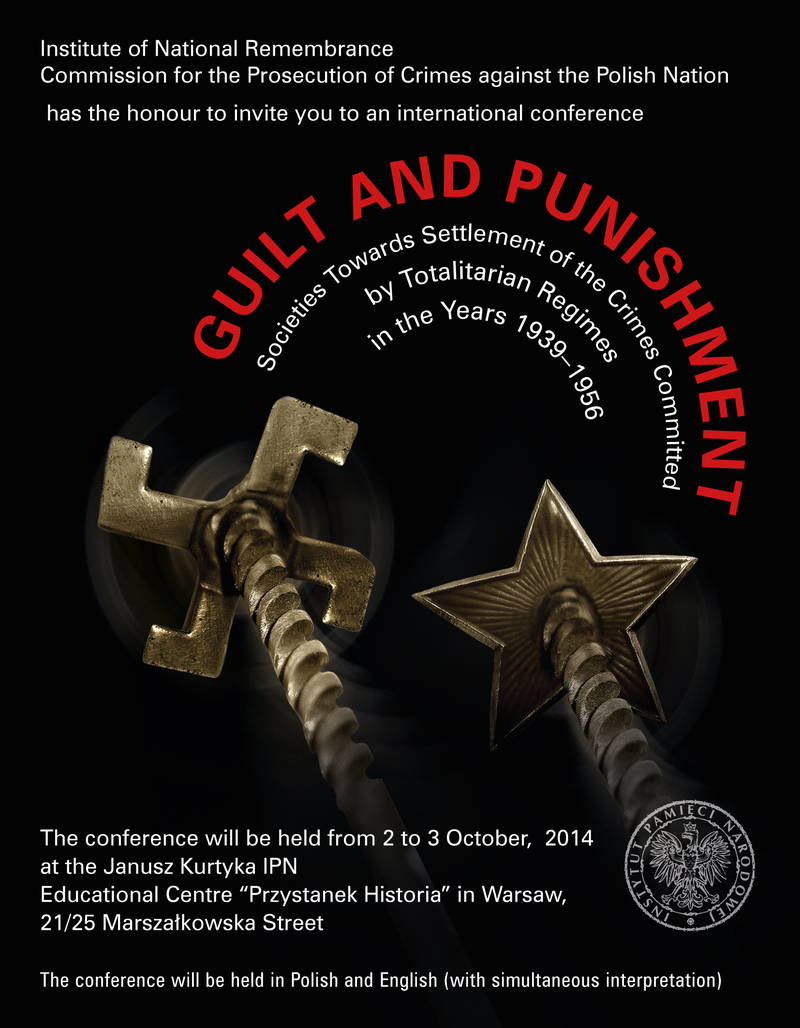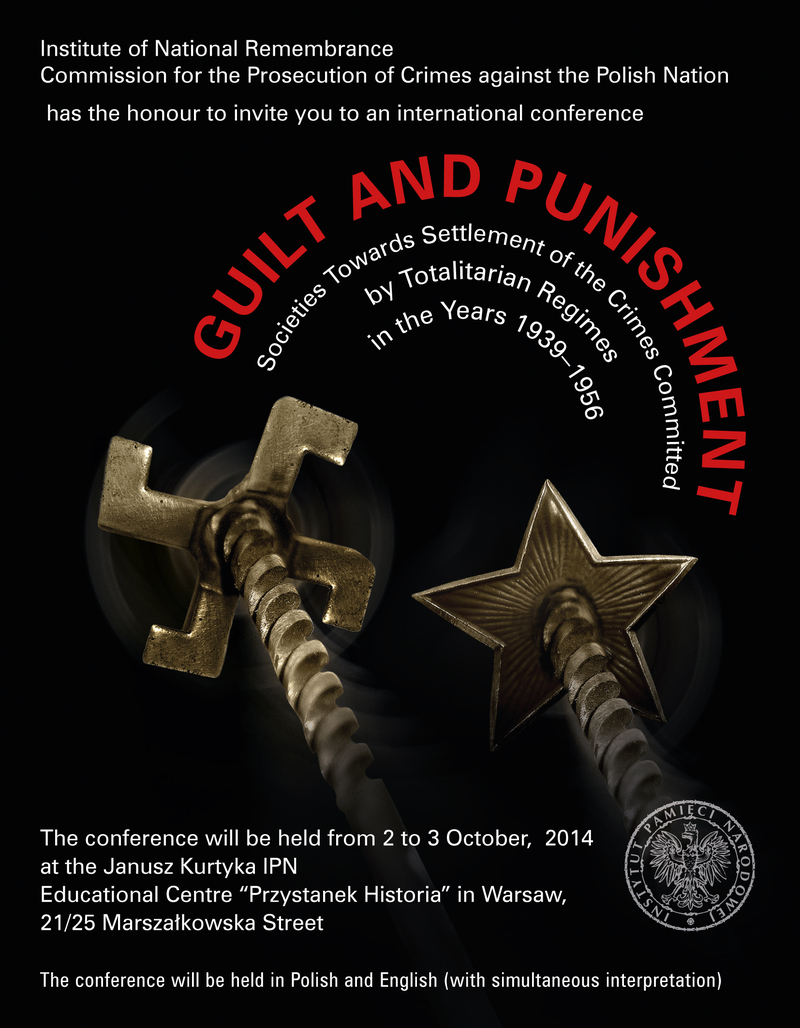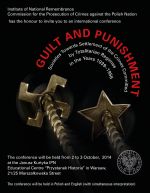| Description |
Can totalitarian system undergo historical judgment? The crimes committed
by the Nazis and Communists cannot be undone or erased. At the moment there are
various attitudes in the public awareness around the world towards the heritage
of totalitarianism, experienced directly or indirectly. To this day, many
countries are also struggling, despite the increasing distance in time, with
the settlement of the past, which influences sometimes very clearly the current
political and social life. Attempts of similar settlements were taken both
immediately after the war, as well as to a limited extent after 1956. The concept of the conference was created on the basis of two time
orders. The first is the time of the crimes committed by Nazi Germany and the
Soviet Union during World War II and the communist authorities from the period
after the war until 1956, when there was a partial departure from Stalinist
oppression. The second and more important time order covers the entire post-war
period of the European and world history until the present day. During that
period settlement with these crimes took place and the social consciousness of
the totalitarian heritage developed. The duality of the time orders is reflected in the theme structure of
the conference. Therefore, it would be desirable that the consideration and
analysis planned for each module, starting from the chronological and
geographical logic, are routed to the present situation. The main aim of the conference is to establish the characteristics of
the settlement of crimes committed by the Nazi Reich and the Soviet Union. However,
those two countries will not become the only object of analysis. For obvious
reasons, the crimes committed by them affected other countries from the Baltic
States to France. In comparison, it would be tempting to signal the settlement
of the military past of the regimes, which were closer to authoritarianism than
totalitarianism like Japan and Italy. Implementation of the abovementioned issues will require an
interdisciplinary approach, possible by the completion of an international team
of researchers of various specialties: historians, political scientists,
sociologists, and anthropologists. P R O G R A M 2 October 2014 9.00–9.10 – Opening of the conference Societies and Nazi
crimes 9.10–10.50 – German Context, Part I Chair: Dr Tomasz Łabuszewski - Kirsten Goetze (Germany) –
Dictatorship's Long Shadow: German Society and German Justice 1933–1945
- Dr Jane Lenzina (Bundesstiftung
zur Aufarbeitung der SED-Dictatur, Germany) – Settlement with the Nazi
Past in West Germany: Reflections on the Sources of Continuity and Change
in Postwar Collective Memory
- Dr Paweł Kosiński (Institute of
National Remembrance, Poland) – Reception of the Nuremberg Trials in the
German Society
- Daria Czarnecka (National
Archives in Katowice, Poland) – Trials in Dachau: Victorious Justice or
Justice of the Winners?
- Discussion
10.50–11.10 – Coffee break 11.10–12.05 – German Context, Part II Chair: Dr Kazimierz Krajewski - Joanna Lubecka (Institute of
National Remembrance, Poland) – How to Understand the Nazis: Rationalisation
and Understanding Issues in the Postwar Trials and Psychological Research
- Helena Anna Jędrzejczak (Warsaw
University, Poland) – Dietrich Bonhoeffer – Forgotten (?) Thoughts on Guilt
and Punishment in the Context of Fight with Nazi Regime
- Discussion
12.05–13.00 – Polish Context Chair: Dr Kazimierz Krajewski - Łukasz Jasiński (Museum of the
Second War World, Poland) – Selected Aspects of the Activity of the Commission for the Examination of
German Crimes in Poland
- Dr Dariusz Burczyk (Institute
of National Remembrance, Poland) – The Activity of Special Penal Court in
Gdańsk (1945–1946) as an Attempt to Settle the Nazi Crimes Committed in
Pomerania, Mazuria and Warmia Regions
13.00–14.00 – Lunch break 14.00–15.40 – Central and Eastern Europe: The Balkans Chair: Dr Patryk Pleskot - Olga Tsadko (European
Humanities University, Lithuania) – Transformation Processes in Collective
Memory of "Hornung" Punitive Action Victims in 1943
- Dr Ruslana Martseniuk (Ukraine)
– Heroes or Traitors: The Problem of (Non-) Recognition of Waffen SS Soldiers
in Ukraine and Latvia
- Agata Biernat (Nicolaus Copernicus University,
Poland) – Responsibility of the Ustaša Crimes during the World War II
- Prof. Piotr Żurek (University
of Bielsko-Biała, Poland) – Liberation Front and "Anti-Communist
collaboration": Contemporary Slovenia towards its own Second World War History
- Discussion
15.40–16.00 – Coffee break 16.00–17.40 – International Context Chair: Dr Patryk Pleskot - Georgia Kipouropoulou (University
of Western Macedonia, Greece) – The German Occupation in Greece: Economic,
Political and Social Consequences
- Prof. Wichert ten Have (Holland)
– Post-Second World War
Views on War-Time Paradoxes in the Netherlands
- Prof. Jacek Tebinka (University
of Gdańsk, Poland) – The British and the Americans towards German Crimes Committed
during the Warsaw Uprising: Heinz Reinefarth's Case
- Dr Krystyna T. Zamorska (USA) –
The Second World War and the Cold War: Post-War Americanization of German
Crimes in Poland
- Discussion
17.40–18.00 – Coffee break Societies and Soviet
crimes 18.00–19.30
– Russian Context Chair: Dr Patryk Pleskot - Prof. David Rich (Catholic University
of America, USA) – My Terror-State, Your Terror-State: Soviet Justice for
Soviet Collaborators 1944–1956
- Prof. Karol Karski (Warsaw
University, Poland) – International Criminal Law as the Basis of
Penalisation of Soviet Criminals: Wasyl Kononov's Case behind Latvian Courts
and Strasbourg Tribunal
- Prof. Oxana Petrowskaja (Russian
Institute of Strategic Research, Russia) – Stalin's National Policy during
the Second World War in the Contemporary Russian and Belarusian History Course
Books
- Discussion
3 October
2014 9.00–10.30 – Polish Context Chair: Dr Robert Spałek - Barbara Padło (Office for War
Veterans and Victims of Oppression/Warsaw University, Poland) – Responsibility
of Stalinist Judges for the Crimes Committed in the Past
- Prof. Joanna Wojdon (Wrocław
University, Poland) / Dr Marcin Dyś (Wrocław University, Poland) – The Settlement
of Stalin's Policy in the Polish History Course Books
- Dr Tomasz Łabuszewski
(Institute of National Remembrance, Poland) – The Settlement of Stalinist
Crimes in Poland: Facts and myths
- Discussion
10.30–10.50 – Coffee break 10.50–13.00 – Eastern Bloc Context Chair: Dr Patryk Pleskot - Prof.
Bernd Schaefer (Woodrow Wilson International Center, USA) – Post-1990
United Germany and Communist Crimes
- Dr Ihar Melnikau (redactor of
the portal "Historical Truth", Belarus) – Contemporary Official Belarusian
Historiography towards the History of "Unification" of Western Belarus
with Soviet Union in September 1939
- Dr Csilla Kiss (University of
Western Hungary) – Reckoning with Stalinism: Politics, History and Memory
in Hungary
- Dr Teon Dzingo (Institute of
National History, Macedonia) – Goli Otok: The Island of Death
- Bedrudin Brljavac (University
of Sarajevo, Bosnia-Herzegovina)
— Dictatorship under the Tito's Era in Yugoslavia: The Sense of National Identity
- Discussion
13.00–14.00 – Lunch break "Peripheries" of
totalitarisms 14.00–15.00
– Japanese War Crimes Chair: Dr Tadeusz Ruzikowski - Dr Katarzyna Starecka (Warsaw
University, Poland) – Japan towards the Tokyo Tribunal's Sentences
- Dr Łukasz Stach (Pedagogical
University, Poland) – Crime without Punishment? Japanese War Crimes: Its Course,
Settlement and Impact on the Contemporary Relations between Japan and
Asian and Pacific Countries
- Discussion
15.00–16.00 – Italy During the War Chair: Dr Tadeusz Ruzikowski - Dr Krzysztof Strzałka
(Jagiellonian University, Poland) – Should We Punish the Fascists? The Question
of Guilt and Settlement in Post-War Italy's Political Situation
- Giuseppe Perri (Ministry of
Education, Italy) – War Internment and Treatment of Foreign Jews in the
Second World War by the Italian Fascist Regime
- Discussion
16.00–16.20 – Coffee break 16.20–17.20
– Assessment of the Collaboration in the
West Chair: Dr Patryk Pleskot - Katarzyna Nuckowska-Cherek
(Institute of National Remembrance, Poland) – Directions of the Norwegian
Policy towards the Post-War Germany 1945–1955
- Prof. Jerzy Eisler (Institute
of National Remembrance, Poland) – The State of Vichy
- Discussion
17.20–18.20
– Unfinished Neutrality? Chair: Dr Patryk Pleskot - Prof. Paweł Jaworski (Wrocław
University, Poland) – Swedish Settlement of the Strategy of Neutrality
from the Second World War Period
- Dr Paweł Duber (Poland) – Switzerland
during the Second World War from the Perspective of Independent Experts
Commission (Bergiers' Report)
- Discussion
18.20–18.30 – Conclussion of the
Conference |


